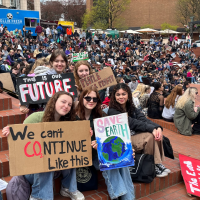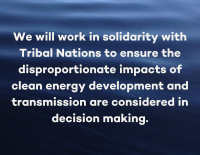We will play a leadership role in community organizing, legal, and communications to stop the proposed fossil fuel infrastructure.
Read or Listen to our Strategic Plan Now:
Our Goals
- Protect the Columbia River and river communities from fossil fuel infrastructure by working in partnership with impacted communities and Tribal Nations
- Promote policies and legislation that restrict fossil fuel development in the Columbia River basin, including terminals, pipelines, and facilities that increase the region’s dependence on fossil fuels
- Promote clean energy policies and legislation with a focus on opportunities to work in solidarity with Tribal Nations and BIPOC organizations and communities
The Problem
For nearly two decades, the Columbia faced an un – precedented number of coal, oil, and gas-shipping terminals, which threaten public health and safety, the river, and our climate. Pollution from fossil fuel facilities often disproportionately impacts Tribal Nations and BIPOC, low-income, and rural communities. Investing in long-term fossil fuel infrastructure impedes our progress toward renewable energy and clean fuels. Thanks to our incredible members and partners, we have had great success. But our work is not done.
The 2022 – 2024 Strategic Plan takes on the fracked gas and oil industries. Fracked gas, also called “natural gas,” is 90 percent methane. Methane is an extremely potent greenhouse gas. Recent scientific studies show that the climate impact of fracked gas is nearly as bad as coal—or perhaps even worse. This is because methane leaks directly into the atmosphere during fracking and transportation. The fracked gas industry plans a stunning increase in fracked gas infrastructure and consumption in Washington and Oregon. This includes fracked-gas-to-methanol refineries, new pipelines, and power plants. Stopping the nation’s largest new methane users is an important step to fight climate change.

The oil industry also sees dollar signs when it comes to the Columbia River. Oil companies jumped on a truly dangerous idea: send crude-oil in trains along the Columbia River to West Coast shipping ports, where oil supertankers would sail through the estuary to the Pacific Ocean. What could go wrong? Tesoro planned to build the nation’s largest oil-by-rail terminal in Vancouver, Wash., to ship 360,000 barrels of explosive Bakken crude or tar sands oil each day. We celebrated a major victory in 2018 when Governor Inslee rejected this cli – mate-wrecking project. Meanwhile, Zenith Energy started shipping crude and tar sands oil in Portland, OR. Our plan: work with Tribes and people who care about their communities and the Columbia to challenge the fossil fuel industry and protect what we love.
Our Plan
Advocate for Climate Action in River Communities
In collaboration with community members, we will advocate for the City of Vancouver to adopt a permanent fossil fuel infrastructure ordinance and ensure implementation of the Portland Fossil Fuel Ordinance.

Challenge Claims about Alleged Clean Energy
We will engage on alleged fossil fuel replacement projects, such as NEXT Energy’s renewable diesel refinery, with significant potential impacts to climate, habitat, and risk of conversion to fossil fuels.
Stop Fracked Gas Infrastructure
We will work with impacted community members to stop the proposed Port Westward fracked-gas-to-methanol refinery and prevent new gas power plants, including the proposed Perennial Power Plant. We will also play a leadership role in community organizing, legal, and communications to stop the proposed GTN gas-pipeline expansion, an existing fracked gas pipeline through Washington, Idaho, Oregon, and California.
Stand Up to Oil
We will watchdog the Global Partners terminal and stop expansion of oil-by-rail if a proposal arises. We will also defend the City of Portland’s decision rejecting oil operations at Zenith Energy and continue to engage in the regional Stand Up to Oil coalition.
Support Just Transition Clean Energy Policies
We will work in solidarity with Tribal Nations to ensure the disproportionate impacts of clean energy development and transmission are considered in decision making, including anticipated legislation in Oregon and Washington.

